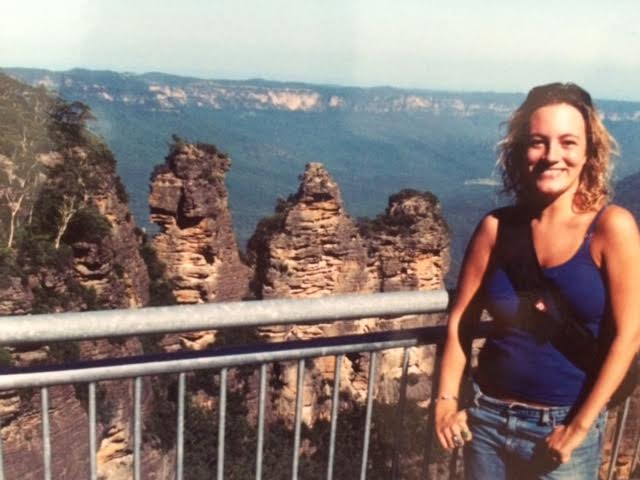 While reading the Forum on Education Abroad’s Frontiers Journal, I came across a thought provoking article by John Lucas of IES. In this piece Lucas writes about the struggles and challenges that Resident Directors face with study abroad students who have mental health issues and how many of these issues are pre-existing conditions. This got me reflecting about how mental health in our society is often under discussed and how many parallels exists between the stress of culture shock for study abroad students, mental health, and a population that I have worked with for years–addicts.
While reading the Forum on Education Abroad’s Frontiers Journal, I came across a thought provoking article by John Lucas of IES. In this piece Lucas writes about the struggles and challenges that Resident Directors face with study abroad students who have mental health issues and how many of these issues are pre-existing conditions. This got me reflecting about how mental health in our society is often under discussed and how many parallels exists between the stress of culture shock for study abroad students, mental health, and a population that I have worked with for years–addicts.
Baby Steps
Perspective is in the eyes of the beholder. Little does one realize how powerful those few words can be. For over ten years I have devoted my professional career to helping people become more aware of the world around them and remove the stereotypes and misconceptions they have held not only about themselves but also about other people that they had come into contact with. Many of my clients have had severe addictions and could not tell you the last time they experienced a true moment not influenced by drugs or alcohol. Many addicts working towards sobriety begin this journey much like a newborn baby as they learn to walk and take in their surroundings, so is the person in recovery learning how to do things in a whole new way and sometimes they are relearning how to adapt and “be in the moment.”

Many study abroad students will also have similar experiences once they land in a new country and exit the plane. Being taken out of their comfort zones and being placed in a completely new culture with different customs and expectations can make anyone feel as though they are a fish out of water. I can remember back when I first left the States to fly to Australia for my first study abroad experience. I don’t think anyone can ever truly prepare for spending a whole day on an airplane – if memory serves me right it was about a twenty-two hour flight. No matter how hard I tried to stay focused after having breakfast more than once and receiving a care package with toothpaste, an eye mask and slippers I was a little disoriented when we landed. Once I made it off of the airplane I can remember thinking that I must have fallen asleep or that I missed my “designated stop” because everywhere I turned people were Asian. Mind you, this was my first time abroad. looking back I realize how uncultured I was to be thinking this. But in that moment, I felt so much panic and that I wouldn’t be able to find another flight to Brisbane and that my luggage would somehow end up in another country that I would have to track down before my school’s orientation. After I calmed myself down a bit I went over to one of the customer service counters and asked where I was. To my sheer delight and pleasure I was rewarded with an Aussie accent that was music to my ears. I then, being the uncultured American that I was, told them that I thought I was in China or Japan to which they laughed and replied no, it’s peak holiday season. It just goes to show you no matter how prepared you feel sometimes things happen and you have to roll with the punches and laugh at yourself when you can, or least I did.
Coping with change
However, sometimes you will encounter situations that can not be laughed off so easily and that bring about immense feelings of panic. During this time of intense transition students abroad may also feel depression, anxiety or participate in excessive drinking or other types or reckless behavior as a means of coping. One thing that students must remember when they’re feeling lost or completely alone in this new journey is that you are not alone. Other students are in your program and are feeling the same way on this journey and others have traveled these same roads and have come out better and stronger people than when they started. I know I did. During a journey of such tremendous growth and change you will learn more about yourself than you thought possible. Speaking from experience and putting myself into many new situations while in other countries, I learned how to be resourceful, independent, a keen listener, to think on my toes and to always travel with backups and learn to roll with the punches. I say this last caveat because nothing ever truly went to plan and in many cases when I let go of needing a plan is when I learned the most about myself as well as the culture I was in. It was important that I realized changes were going to happen no matter how much I prepared.
Change is also another common aspect that we see linked between addicts and study abroad students. In both cases we are asking participants to change their people, places and things. Study abroad students are making rapid changes and having to adapt to new places and norms quite fast which can also lead to another damaging emotion known as fear. I believe this to also be another common thread with students as they study abroad and use alcohol or other types of impulsive behavior as a means of coping with feelings they are not used to having nor were they prepared to be feeling, despite pre-departure workshops and written materials on the subject being provided by their college or program organizers. This is one of the most important components to any pre-departure program and should be emphasized with great detail, so students are encouraged to consider different issues that may arise as they begin to have new cross cultural experiences for the first time. Ideally students will divulge if they are experiencing any new thoughts or emotions before they leave so that the program or the advisors can assist them in finding the appropriate help they need in order to have a healthy and rewarding study abroad experience. However, this does not happen often enough (and as I read in Mr. Lucas’s article many students do not talk about their mental health issues before leaving and often have a lapse in resources once they arrive in their new country). As a means of prevention, I feel it is extremely important that every school has a list of resources that they give to students during their pre-departure orientation for use upon arrival if they need help.
Mentors and Mik

Another great resource for students prior to departure is access to a mentor to help alleviate any anxiety they may be feeling. I was a mentor for other students looking to study abroad when I returned back to the States. Serving in this capacity was a means of helping the student work through some upcoming cultural adjustments they would need to be prepared for and also to help ease some of the anxiety that they were going through as they prepared to leave. Many students start to feel a little lost about what to pack and what they will need when they are abroad. Many forget that just because you are getting on a plane and going to another country to learn doesn’t mean that they won’t have shops abroad. The funny thing about learning abroad is that we just do things differently based on our culture and how we were raised. For example, living in Burleigh Heads I had to get used to the fact that the stores including the grocer and mongers (grocery stores/speciality stores) would be closed when there was a good swell. Australia is a surfer community where the salt water runs thicker than blood in most people’s veins, just another cross cultural adjustment I needed to make. In order to make sure I had food I always went shopping after the swells.
The study abroad mentor should be a returning study abroad student or a student from that specific country. That way students can become more comfortable speaking with people who are from that specific country, especially if English is not the primary language. Study abroad mentees can ask specific questions or address concerns they may have. Students could also speak with their mentor about things they will encounter on a daily basis, such as means of transportation, cultural activities (much like my example above) and areas to be aware of. As a former study abroad student I would have found a mentor extremely helpful in guiding me to have a true immersion experience and what I would need to do in order to make that happen.
As I look back on my own study abroad experience I am reminded of a specific moment that taught me a humorous cultural lesson. I was living in Burleigh Heads at an apartment complex off the Gold Coast of Australia. I had just come home from a long day at Uni, put my key in the door and was about to turn the knob when my door fell completely off the hinges. To my surprise and maybe more so shock I just stood there laughing for a few minutes. After I composed myself, I headed down to the office and spoke with the maintenance man, Mik and told him my dilemma. Mik was an old school surfer with salt and pepper hair, cut-off jean shorts that were fraying and near the end of their life. He had a thick accent, something that took me awhile to get used to, and a tan that would make any beach goer jealous. He never wore a watch and determined the time by the whistles of the lorikeets that lived in the trees near my building. After a few minutes he assured me that I had no worries and it would be fixed. Little did I know that no worries and “would be fixed” meant that I would have to lean my door against my open frame for the next week and hope that no deadly animals or wandering surfers happened to make themselves comfy in my apartment. Needless to say Mik finally showed up with a screwdriver and all of my fears were put to rest.
Savoring gratitude
I discovered a lot about myself as I waited for that door to be reattached, yet self discovery and finding your identity is something we all go through whether or not you have to rely on someone new (while hoping that today might be the day you have a door on hinges again)! It is during these moments of discovery that we begin to develop gratitude and humility. Why are these qualities so important? In recovery the term “have an attitude of gratitude” is a common mantra heard daily. Sometimes the smallest gesture of a smile or a thank you is all that needs to be made in order to have a lasting effect. While in Thailand at an open market in Chiang Mai I said thank you to a vendor’s daughter in Thai and was rewarded with the kindest smile, as she rushed over to tell her father what had happened. It stuck me in an odd way that these simple words in one’s own language would mean so much?
Upon reflecting on the moment years later I have come to realize it was probably not just the words that meant so much to her, but the fact that I took the time to learn a few words in her language. In a way this shows that I was interested in investing time in their culture not just traveling around to the different sights. So don’t be afraid to make a mistake and try to learn a few key-words in your host country’s language before you leave. This is where your mentor would really help to guide you along in your preparation with your trip. Humility can play a large role when traveling no matter who you are. Remember, just because something isn’t how you would do it back home or that you feel you know a better way, sometimes those moments are the greatest learning experiences and give yourself the opportunity to be humbled by someone else’s teachings.
Whether you are a counselor or a study abroad advisor getting students prepared to leave remember the importance of getting people to be present in the moment. Change can be challenging and scary however it can also be extremely rewarding and life changing. Just like the small child who takes his first step to discover the world and what it holds so can you. Go willingly with an attitude of gratitude and don’t be afraid to become humbled along the way.
 About the Author: Ashlee Minehart is a nomadic, adventurous thrill seeker at heart who enjoys finding the extraordinary in the ordinary. Whether it’s riding elephants in Thailand, paddleboarding in Bali or trying a new local delicacy like fried bugs in India, there is never a dull moment when she is around. Ashlee values immersing herself in the culture of her current destination. A risk taker at heart she often lets fate decide her travel path. Ashlee comes from a background of counseling and investigation and has spent most of her professional career assisting those who need her most – from human trafficking victims to refugees. She is someone who travels to learn and embrace the culture and finds the most rewarding memories of her trips to be the relationships she’s made rather than the places she sees. You can often find her planning travel reunions with these friends she’s made and making sure that the trips are focused on true immersion experiences, she’s never afraid to get involved or a little dirty when people need her help. Ashlee is also a fan of coffee from around the world – and as she often says, “Every traveler knows no matter where you go, an amazing cup of coffee is something to be savored.”
About the Author: Ashlee Minehart is a nomadic, adventurous thrill seeker at heart who enjoys finding the extraordinary in the ordinary. Whether it’s riding elephants in Thailand, paddleboarding in Bali or trying a new local delicacy like fried bugs in India, there is never a dull moment when she is around. Ashlee values immersing herself in the culture of her current destination. A risk taker at heart she often lets fate decide her travel path. Ashlee comes from a background of counseling and investigation and has spent most of her professional career assisting those who need her most – from human trafficking victims to refugees. She is someone who travels to learn and embrace the culture and finds the most rewarding memories of her trips to be the relationships she’s made rather than the places she sees. You can often find her planning travel reunions with these friends she’s made and making sure that the trips are focused on true immersion experiences, she’s never afraid to get involved or a little dirty when people need her help. Ashlee is also a fan of coffee from around the world – and as she often says, “Every traveler knows no matter where you go, an amazing cup of coffee is something to be savored.”

